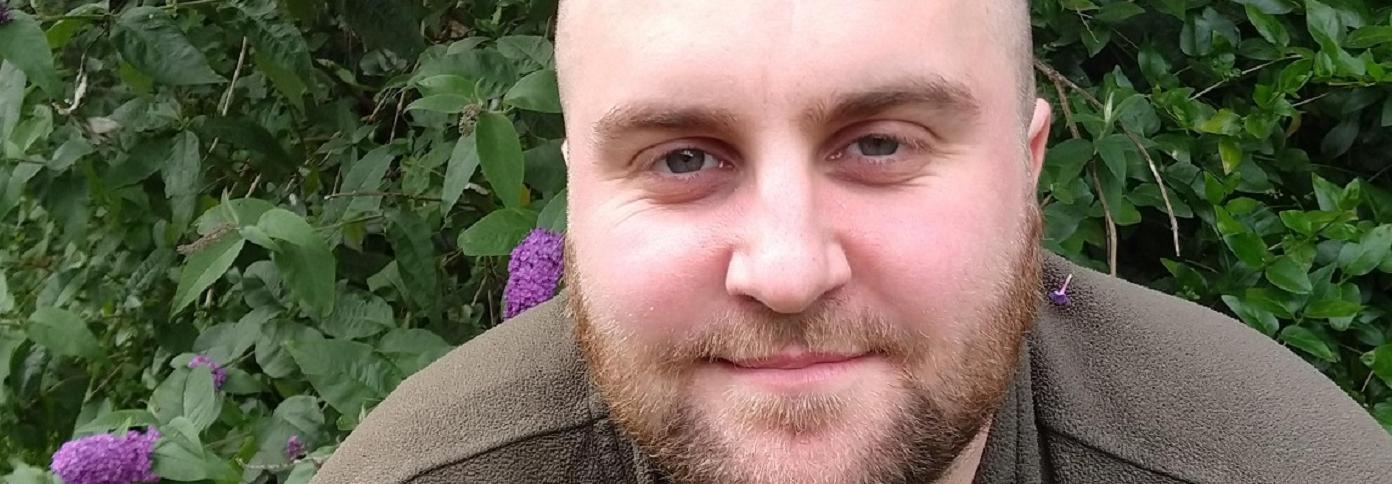
Guest blog by Andrew Kirkland, Environmental Science BSc graduate
I have a minor scar on my forearm, acquired in my early twenties when I momentarily pressed against the body of a supercharger belonging to an impressively large (and very hot) engine, whilst crewing a grain-laden bulk carrier across the Indian ocean. It’s a small, but permanent, physical reminder of where I have been, both physically and mentally and has regularly aided introspection.
One of my more significant reflections occurred during a woodland walk at the end of my engineering cadetship. The cool weather, quietness and natural sensory experience was a complete antithesis to the relentless and oppressive heat and noise of engine rooms. I took a moment to sit and absorb my surroundings, but found myself staring at my scar. It was at that moment where I realised, I desired a career in the environmental sector.
Yet acquiring a start in conservation can be challenging. This is due to its popularity as a career choice, and as the sector often struggles to fund enough people to achieve its aims. Therefore, employers are keen to hire applicants with an existing range of skills, knowledge and experience. Following a stint of volunteering with the National Trust for Scotland in 2013 and a stream of job rejections, I learnt what skills were desired by employers and therefore sought relevant training to address my areas of weakness.
Enter Lantra.
Lantra facilitated my training and accreditation for a range of skills and tasks, such as knapsack pesticide spraying, chainsaw maintenance and basic tree felling, brush cutting and first aid. This training had an immediate impact as I was offered employment to undertake snedding to support tree felling operations. Subsequently, the training I had acquired via Lantra helped me secure further employment in the land-sector, where I undertook practical conservation and amenity work for NGOs, farm and estates, and private contractors. Before seeking out training, volunteering had boosted my CV so I was often among the ‘top three candidates’ for jobs. However, it was ultimately the Lantra accreditation that tipped the scales of employment in my favour.
On reflection, my training didn’t simply benefit me financially, instead, it also provided me with the flexibility to experience a variety of roles within the land-based sector. This was incredibly useful, as it helped me focus on my career aspirations.
I have since completed an honours degree in Environmental Science which I seek to combine with my employment experience to forge a career focused on environmental policy. I sincerely believe that policy could have the greatest impact on conserving the Highlands and Island’s biodiversity and improving the sustainable development of its abundant natural resources. Yet despite these positive experiences, I am once again staring at the scar on my forearm, which has aged by ten years, and am reflecting on the future.
This period of reflection is not surprising; It is currently 2020, and I’m penning this blog during the Coronavirus lockdown, whilst my blissfully unaware, new-born daughter sleeps on my lap. The long-term effects that Coronavirus may have on our daily lives and conservation efforts could be significant, yet the more immediate impacts such as economic down-turn, reduction in job availability and subsequently increased job competition are happening right now.
More than ever, candidates must demonstrate how they differ from the crowd, and this is where I know my Lantra accreditation will prove that difference. Currently, several graduate environmental positions have been postponed, yet there are numerous postings available for amenity work within the land-sector. Such work offers me a buffer to support my new family in these most uncertain times, and puts my knowledge of tree felling, strimming, and associated skills to good use. It will also help me to continue building useful contacts and develop my wider appreciation and understanding of the complexities of land use and management.
So, on reflection, I am grateful for taking the time to invest in myself via Lantra. By doing so, I have improved my employability, aided my career progression and helped me identify my ultimate career goal — environmental policy.
However, for now, I dare not move and instead will resume ‘supercharger scar’ reflection, as otherwise, I may stir a bonnie sleeping bairn.